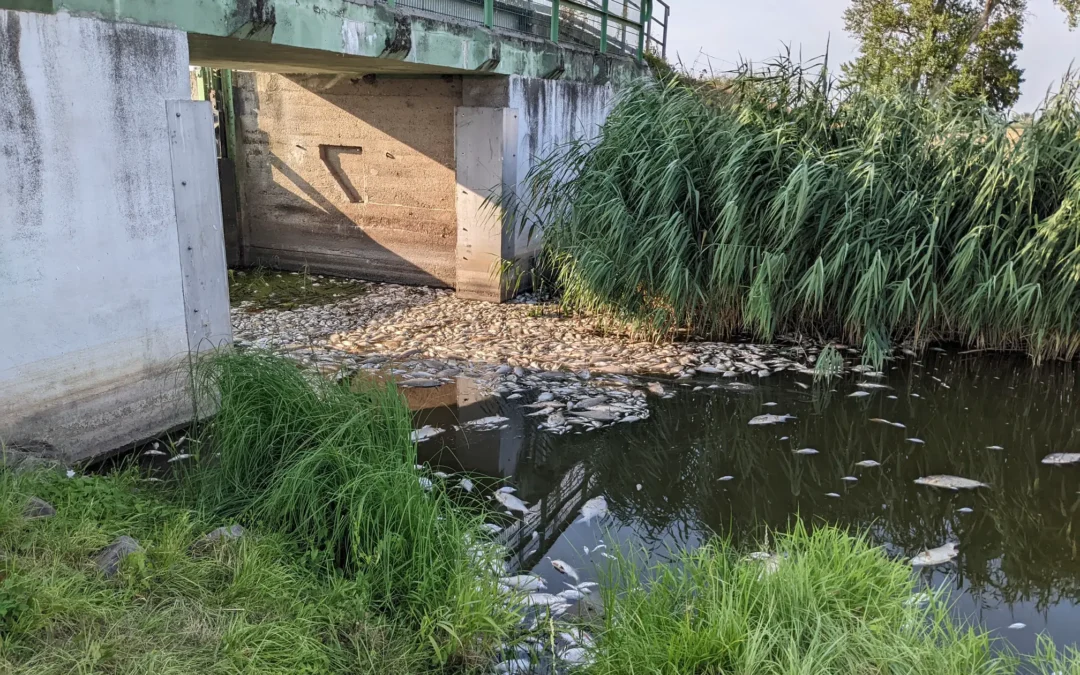A report by Poland’s state auditor has identified numerous failings by the Polish government and other state authorities in relation to last year’s environmental crisis in the Oder. It says these exacerbated the scale of the disaster, which resulted in the death of over half the river’s fish.
“Our audit has shown that the Polish state was unfortunately not prepared and did not respond properly to the threat,” said Marian Banaś, head of the Supreme Audit Office (NIK).
Kryzys ekologiczny na Odrze pokazał, że organy państwa nie były przygotowane do przeciwdziałania zagrożeniom spowodowanym zanieczyszczeniem rzek. To efekt wieloletnich zaniechań, błędnych działań, a także niewystarczających rozwiązań prawnych: https://t.co/g5yGnFyDVl pic.twitter.com/OKTQlDLiYa
— Najwyższa Izba Kontroli (NIK) (@NIKgovPL) November 14, 2023
A report by the European Union earlier this year likewise found that poor communication by the authorities hampered the response to the disaster. Germany’s government in June also said that not enough was being done to protect the Oder.
Warsaw has rejected such accusations. NIK’s 265-page report, however, points to years of negligence and poor decision-making that led to the ecological catastrophe. After the crisis broke out, NIK says that the relevant authorities initially remained passive, with the public not warned and access to the river not restricted.
The first information about massive fish die-offs in the Gliwice Canal – which leads into the Oder and is where the crisis originated – was made public on 14 July 2022, with similar reports about the pollution of the Oder and Oława river following on 27 July.
Despite the fact that such information was sent to the government-appointed governors of the Opole and Lower Silesia provinces, as well as to the infrastructure ministry and climate ministry, NIK found that the incident was not initially treated as seriously as it should have been by the authorities.
An EU report on the ecological disaster that killed 360 tonnes of fish in the Oder river last year has found:
– industrial waste was a key factor
– poor communication hampered responses
– the incident should be a "wake-up call" for better river management https://t.co/TohdbNlLnS— Notes from Poland 🇵🇱 (@notesfrompoland) February 27, 2023
The report also points out that, contrary to crisis management regulations, the information was not immediately forwarded to the Government Security Centre (RCB), the body responsible for crisis management. NIK also concluded that the RCB was marginalised by governors and ministers during the crisis.
As a result, the country’s crisis management protocols were not activated early enough. According to NIK’s report, appropriate actions were not taken until 10 August. The lack of immediate action to remove dead fish from the river and stop them from moving downstream caused secondary pollution of the river.
The auditors also draw attention to the incorrect implementation of international obligations, pointing out that the situation should have been immediately reported to Poland’s neighbours, the Czech Republic and Germany.
Germany says Poland is not doing enough to protect the Oder after a new report found that over half the river's fish died off due to last year’s environmental disaster.
But a Polish government official says Germany is spreading disinformation https://t.co/gOQ0HReJvN
— Notes from Poland 🇵🇱 (@notesfrompoland) June 29, 2023
“The situation in the summer of 2022, however, is only the tip of the iceberg,” added Banaś. “This disastrous situation is the result of years of inaction and mistakes.”
NIK pointed out that the bad water quality and increasing salination levels have been known to the authorities for years, with NIK itself informing about them as early as 1999. Despite this, effective measures to reduce the salinity levels of the Oder were not implemented.
The report revealed that the national crisis management plan – which is the main planning document defining the procedures for the participants in the crisis management process – does not include the threat of contamination of surface waters, particularly rivers, nor establishes procedures for necessary actions.
🇬🇧 summary of Polish🇵🇱 pre-report on #Odra river poisoning. What is needed:
▶️ continuous monitoring of toxins and temperature online
▶️ flexible discharge permits depending on water conditionMaybe some common demands with 🇩🇪 report to come tomorrow… https://t.co/pRhwjtgGZb
— Hannah Neumann (@HNeumannMEP) September 29, 2022
The report also found that the infrastructure ministry failed to ensure ongoing monitoring and analysis of the effectiveness of the activities carried out by the state water manager company. The climate ministry and environmental protection inspectorate failed to ensure public access to water quality tests of the Oder.
The audit was also critical of the legal changes that exacerbated the situation, in particular the rules for assessing water quality adopted by the infrastructure ministry in 2021, which did not take into account the salinity indicators in force in earlier years.
Poland’s government has, however, insisted that it has been properly managing the country’s waterways. Last year, the environment minister accused German media of spreading “fake news” about the catastrophe in the Oder.
Since becoming head of NIK, Banaś has become a prominent critic of the government, with his institution producing a number of reports pointing to failings – and even alleged criminality – by ministers.
A government project to build a canal allowing ships to avoid Russian waters was economically unjustified and involved unlawful spending, the state audit office has found.
It called the canal, which opened last year, an “uneconomical path to nowhere” https://t.co/5wNi1w5VWo
— Notes from Poland 🇵🇱 (@notesfrompoland) November 10, 2023

Notes from Poland is run by a small editorial team and published by an independent, non-profit foundation that is funded through donations from our readers. We cannot do what we do without your support.
Main image credit: Hanno Bock/Wikimedia Commons (under public domain)

Agata Pyka is a former assistant editor at Notes from Poland. She specialises in Central and Eastern European affairs, cybersecurity, and investigative reporting. She holds a master’s degree in political communication from the University of Amsterdam, and her work has appeared in Euractiv, the Balkan Investigative Reporting Network (BIRN), and The European Correspondent, among others.



















